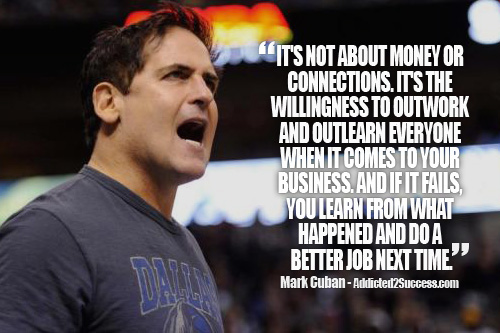So you’ve decided to become an entrepreneur. Great! You probably already have plans to become the next Silicon Valley giant, giving Mark Zuckerberg or Sergey Brin a run for their money. Maybe you want to build the next WhatsApp you can sell to Facebook for a mind-boggling $19 billion. Maybe you just want to be really, really, rich.
Being an entrepreneur, though, is much more than just wanting to make a huge pile of money. It’s about taking the initiative to be in control of your destiny and making things happen on your own terms.
Building Your Own Dream
It’s been said time and again that if you don’t work toward building your own dream, somebody else will hire you to build theirs. Nowhere is this more true and more currently relevant than in the case of Brian Acton.
It was 2009 when Acton’s job at Yahoo ended, where he had filled various engineer roles for over 11 years. In his now-famous tweets, he shared how both Facebook and Twitter turned him down when he asked them for a job. He was composed about it, too, saying it was okay, the commute to Twitter HQ would have been long, and that his Facebook experience was a great opportunity to connect with people.
Acton didn’t just let the rejections put him down: he turned the whole thing around on its head by deciding to put up his own company with a former Yahoo colleague.
WhatsApp was a replacement for sending SMS. Basically, it allowed you to send text messages over the Internet, avoiding texting fees, and letting you message people even when you didn’t know their phone number. Conversely, it lets you get in touch with other people while keeping your phone number private.
Over the course of four years, WhatsApp was able to penetrate many markets, but most importantly, India. It’s available for download even for feature phones like the Nokia Asha, which requires very little or almost no data fees. In a third-world country like India, a service like WhatsApp that lets them avoid texting fees is sure to become popular, which it did. As of last count, it had 450 million active users.
What makes it so valuable to Facebook is that WhatsApp is well on its way to getting more than a billion users. This is crucial to Facebook’s Internet.org project, whose mission is to provide Internet access to the other two thirds of the people on this planet who aren’t still connected. This is expected to happen in developing markets like India.
This week, Facebook bought the app for a staggering $19 billion, breaking Silicon Valley records and putting it on par with Hewlett-Packard’s acquisition of Compaq in 2002.
Making a Difference
Mark Zuckerberg himself, founder of Facebook, has one of the most relevant entrepreneurial stories of today. We all know the details: Zuckerberg co-founded the social-networking site out of his Harvard dorm room, and had to leave after sophomore year to concentrate on running it.
Today, Facebook is the world’s largest social network with over a billion active users, and Zuckerberg is a billionaire. Working on his goal of connecting the world through Internet.org and WhatsApp might not have been possible had he been working for someone else.
Financial Courses
The simplest, fastest, and frankly the best way to become an entrepreneur is to simply start. Facebook lives by the mantra “Done is better than perfect.” Just start doing, know why you’re doing it, and you’ll learn along the way.
That being said, the next principle you should live by is to keep educating yourself, and one of the most important areas you can learn about is finance.
Several schools offer financial courses and options on different careers to become a full-time entrepreneur.
The Financial Times cites the University of Chicago’s Booth School of Business as a good start. In the past 15 years, 65 companies started by Booth’s MBA graduates have collectively raised $239 million in funding and created around 1,000. To give you an idea of how significant this is, consider the statistics: every year, only about 1,000 companies in the U.S. get their first venture funding.
Booth strengthens this thrust through the Polsky Center for Entrepreneurship. The school had started focusing on dotcom businesses during the technology boom, but prides itself on maintaining that interest.
Stanford University offers Launchpad, a class designed to build tolerance for risk. Students incorporate within the first two weeks of class, and try to keep their companies afloat as they navigate a series of hurdles. Students stage a trade show midway through the semester where “venture capitalists” walk around writing fake checks.
Perry Klebahn, who designed and teaches Launchpad together with professor Michael Dearing, says that being an entrepreneur doesn’t require a high level of intelligence. The important thing, he says, is to be able to fail, learn, and move forward.
The Harvard Business School, whose graduates are the likes of Facebook COO Sheryl Sandberg and NYC Mayor and Bloomberg LP founder Michael Bloomberg, offers Entrepreneurial Finance. It’s designed to help managers make better decisions in terms of investment and financing, whether they plan on being entrepreneurs or investors.
The financial courses guide students through the whole life cycle of a venture, from startup to exit, and what kind of funding to provide at each stage.
MIT’s Sloan School of Management also ranks highly. Business students can enter the $100K Entrepreneurship Competition, which has already successfully launched more than 130 companies that has collectively raised more than $770 million in financing.
Sloan MBAs can work on getting a certificate in entrepreneurship and innovation as part of their graduate business coursework.
The Haas School of Business at the University of California Berkeley also prepares students for understanding the structure and rationale of venture investments. Their entrepreneurship and venture capital education provides would-be entrepreneurs with invaluable knowledge of deal structures.
Cristina Beltran is a writer, blogger and online marketing specialist at Compare Hero, Malaysia’s leading online comparison portal. Tina is also a freelance writer she worked as an information researcher before she pursued her writing career.





